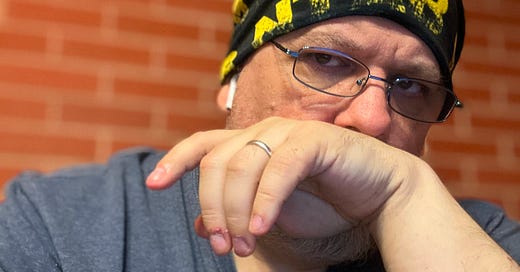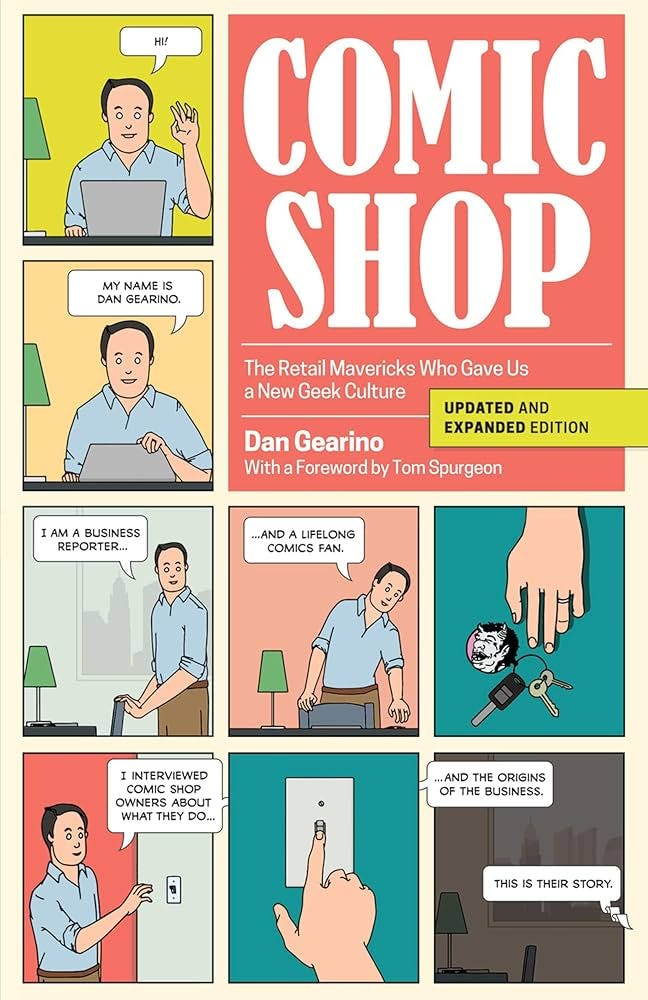The Admin Department would like to apologize for the delay in sending out the weekly briefing. We have been dealing with a lot of behind-the-scenes admin/infrastructure type things this week and it took up most of the bandwidth. This short missive it to let everyone know that the NTAB is continuing apace.
Five Down, Ninety-Five to Go
This feels like a rerun. But no matter. I’m going to wait patiently for the 100 days report card before I do or say anything. I’m predicting a low grade, so I’m not optimistic about it in the slightest. I don’t personally think that my adding to the signal to noise ratio right now is going to be much of a help to anyone, either. Instead, I’ll bide my time and make a few designs that I plan to park on a print-on-demand site like Redbubble. Stay tuned; the NTAB Commissary will open in three months!
Weekly Report from the N.T.A.B. Division of Media Review
Note: our intention to diversify our reviews has been met with the kind of deafening indifference usually reserved for the reading of a school lunch menu, but we nevertheless intend to honor the spirit of the new direction with a small book review to kick things off.
Comic Shop: The Retail Mavericks Who Gave Us a New Geek Culture Paperback (Dan Gearino, 2019)
Dan Gearino, a reporter and lifelong comic book fan, takes a deep dive into the creation and emergence of what would become the Direct Market, the thing that allowed all of you to buy multiple copies of Superman #75 in the hopes of one day funding your escape rocket to the moon.
That didn’t happen, of course, but it’s interesting to note that at that time in America, for a brief moment, comic shops where the place to be. It didn’t last long—only a few months—but that’s not bad for an industry that was only 25 years old at the time.
Gearino uses his local store, The Laughing Ogre, as a barometer for the various ups and downs in the industry’s tumultuous past, as it was one of the original stores that has been open for as long as the Direct Market has been around. Comic Shop is mostly successful at depicting how the world of comics grew from a bunch of hippies and geeky guys in 400 square feet of basement, making change out of a cigar box, into an industry with thousands of shops, chain stores and Free Comic Book Day and all the rest of it. Most of this history was oral because it was pre-Internet and also, none of these movers and shakers were business majors and had no formal experience with creating a distribution network, for example. Stitching that all together wasn’t easy, but Gearino makes it work.
Comic Shop argues that much of this subculture came about by sheer force of will and a generous dollop of luck and being at the right place at the right time. Speaking for myself, it’s a little weird and disorienting to read about a time period, a place and time, that one was directly and actively participating in. I found myself nodding along in many places and Gearino’s narrative dovetails with my own recollections.
Given the news that Diamond Comics recently announced they were filing for Bankruptcy, I found myself somewhat comforted by Joe Field’s assessment of comics being the cockroaches of popular culture, and he meant that in a good way. Comics have survived much worse threats than Diamond’s announcement. And they will likely survive this—assuming the price of printing comics in Canada and China don’t become cost-prohibitive. Eh? Bet you weren’t thinking about that, were you?
The history lesson is only about 2/3 of the book. The rest of Comic Shop is devoted to a rough classifying of the different kinds of stores and nice write-ups of the people who were good examples of that kind of store. Of course, Austin Books was profiled, and friends of mine are name-checked. Cool! The late Rory Root and his store, Comic Relief, was also mentioned reverentially and was rightfully lionized for his contributions to the field. Rory was a friend; he befriended a couple of Texans out of their depth in Berkeley, CA in the 90s, which made Comic Relief a refuge for us, and Rory a voice of reason.
Some of you won’t know who those people are. That’s okay; it’s still a fascinating subject to read about and, considering where all of the most popular movies of the 21st century got their source material from, it’s worth knowing a little something about how the sausage is made. Recommended for all comic book fans, past and present.
A Real Pain (Hulu)
Jesse Eisenberg wrote, directed, and starred in a film about two cousins who take a trip to Poland to honor their grandmother, who escaped the Nazis and fled to America.
It’s Oscar Season, which means there’s a lot of small movies getting a lot of chatter, and while that chatter is always in proportion to the size of the film, as well as its opacity, this one is worth a look. Eisenberg and co-star Kieran Culkin are perfectly, if lazily, cast as the uptight nervous guy and the freewheeling devil-may-care guy, traveling together in a modern-day Odd Couple situation. However, instead of cleanliness, their point of contention is emotional in nature.
It's tempting to dismiss A Real Pain as an art house film, but I think it’s more accessible than most, even Wes Anderson movies. The people all seem not only real, but genuine, and the scenes with their tour group are extremely authentic. The point of the tour—visiting a Holocaust site—isn’t played for laughs, but the overall tour itself has some genuinely funny moments that are rooted in the characters and their baggage, if I can torture the tourism metaphor just a bit.
Both of these actors aren’t usually on my radar because I’ve already seen them in several movies where they are playing iterations of the same characters. In this instance, however, they both manage to shake things up and it’s a refreshing change of pace.
A Real Pain deals with the Holocaust, and also death and grief and the way people grow apart, and the ties that bind us all together. It might sound sad, but it’s not. It’s about people and all of their complications and contradictions. This is one of the nominations you can check out for yourself with some confidence that it actually delivers what it promises. A word of advice: don’t watch the trailer, as it not only gives away the whole movie but also manages to spoil a couple of jokes, as well.







My wife is firmly in the "If Kieran Culkin's in it, I'll watch it" camp, so I suspect this'll be on in our house soon enough.
Thanks for the review of Comic Shop: The Retail Mavericks Who Gave Us a New Geek Culture , I'm always looking to add to my wish-list books on the history of the industry